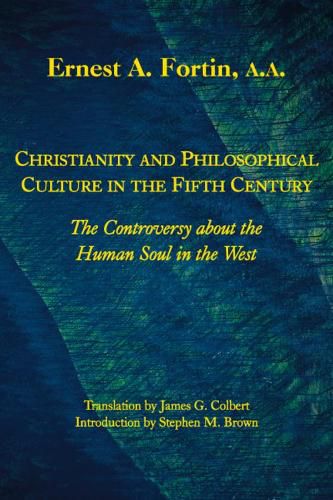Readings Newsletter
Become a Readings Member to make your shopping experience even easier.
Sign in or sign up for free!
You’re not far away from qualifying for FREE standard shipping within Australia
You’ve qualified for FREE standard shipping within Australia
The cart is loading…






The spirituality and immortality of the soul might seem to be an essential Christian doctrine, but in fact many early Christian writers held that the soul is material and that immortality is a gift. As Ernest Fortin’s study of Claudianus Mamertus (d. 475), a priest of Vienne in Gaul, and his De Statu Animae, On the State of the Soul (ca. 470) shows, St. Augustine did not settle the question. De Statu Animae is the only explicitly philosophical work in the West that we possess between Augustine (354-430) and Boethius. It responds to a defense of the corporeality of the soul by Bishop Faustus of Reii, modern Riez. Like many early Christian writers, Faustus held that God alone is spirit, so that the human soul is material, immortality is a gift, and Platonic dialogues or neo-Platonic textbooks of philosophy are the product of unhealthy curiosity.
By contrast, Claudianus is an exuberant Christian neo-Platonist, guided by St. Augustine but also by Porphyry (235-ca 305). In this neo-Platonic tradition, Claudianus argues, for instance, that the created universe would have been incomplete without spiritual or both spiritual and corporeal creatures.
But, secondly, the book’s title alludes to a more general theme: Claudianus Mamertus is a creator of Christian philosophy. As Fortin sees it, Claudianus does not just use philosophy to fight the pagans with their own weapons. He also takes the riskier position of using philosophy as both a stimulus but also a check against bad uses we might make of revelation asking the Bible to answer questions it never asks.
Claudianus Mamertus and his circle, which included the poet Apollinaris Sidonius, are tragic figures. The Roman system of higher education had disappeared in the West. The empire crumbled around them, as barbarian tribes took over Roman Gaul piece by piece. Claudianus and Sidonius knew things would never be the same. They knew they were the last of their kind.
$9.00 standard shipping within Australia
FREE standard shipping within Australia for orders over $100.00
Express & International shipping calculated at checkout
The spirituality and immortality of the soul might seem to be an essential Christian doctrine, but in fact many early Christian writers held that the soul is material and that immortality is a gift. As Ernest Fortin’s study of Claudianus Mamertus (d. 475), a priest of Vienne in Gaul, and his De Statu Animae, On the State of the Soul (ca. 470) shows, St. Augustine did not settle the question. De Statu Animae is the only explicitly philosophical work in the West that we possess between Augustine (354-430) and Boethius. It responds to a defense of the corporeality of the soul by Bishop Faustus of Reii, modern Riez. Like many early Christian writers, Faustus held that God alone is spirit, so that the human soul is material, immortality is a gift, and Platonic dialogues or neo-Platonic textbooks of philosophy are the product of unhealthy curiosity.
By contrast, Claudianus is an exuberant Christian neo-Platonist, guided by St. Augustine but also by Porphyry (235-ca 305). In this neo-Platonic tradition, Claudianus argues, for instance, that the created universe would have been incomplete without spiritual or both spiritual and corporeal creatures.
But, secondly, the book’s title alludes to a more general theme: Claudianus Mamertus is a creator of Christian philosophy. As Fortin sees it, Claudianus does not just use philosophy to fight the pagans with their own weapons. He also takes the riskier position of using philosophy as both a stimulus but also a check against bad uses we might make of revelation asking the Bible to answer questions it never asks.
Claudianus Mamertus and his circle, which included the poet Apollinaris Sidonius, are tragic figures. The Roman system of higher education had disappeared in the West. The empire crumbled around them, as barbarian tribes took over Roman Gaul piece by piece. Claudianus and Sidonius knew things would never be the same. They knew they were the last of their kind.